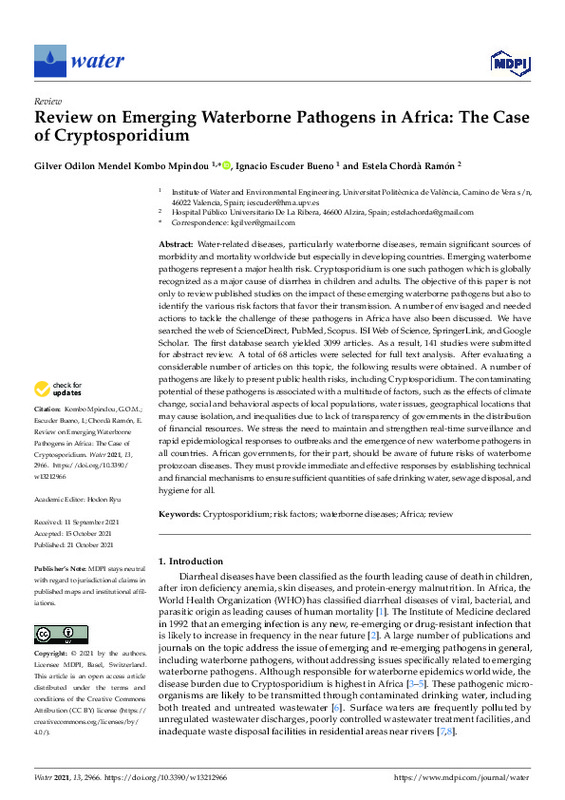JavaScript is disabled for your browser. Some features of this site may not work without it.
Buscar en RiuNet
Listar
Mi cuenta
Estadísticas
Ayuda RiuNet
Admin. UPV
Review on Emerging Waterborne Pathogens in Africa: The Case of Cryptosporidium
Mostrar el registro sencillo del ítem
Ficheros en el ítem
| dc.contributor.author | Kombo Mpindou, Gilver Odilon Mendel
|
es_ES |
| dc.contributor.author | Escuder Bueno, Ignacio
|
es_ES |
| dc.contributor.author | Chordà Ramón, Estela
|
es_ES |
| dc.date.accessioned | 2022-05-25T18:04:00Z | |
| dc.date.available | 2022-05-25T18:04:00Z | |
| dc.date.issued | 2021-11 | es_ES |
| dc.identifier.issn | 2073-4441 | es_ES |
| dc.identifier.uri | http://hdl.handle.net/10251/182915 | |
| dc.description.abstract | [EN] Water-related diseases, particularly waterborne diseases, remain significant sources of morbidity and mortality worldwide but especially in developing countries. Emerging waterborne pathogens represent a major health risk. Cryptosporidium is one such pathogen which is globally recognized as a major cause of diarrhea in children and adults. The objective of this paper is not only to review published studies on the impact of these emerging waterborne pathogens but also to identify the various risk factors that favor their transmission. A number of envisaged and needed actions to tackle the challenge of these pathogens in Africa have also been discussed. We have searched the web of ScienceDirect, PubMed, Scopus. ISI Web of Science, SpringerLink, and Google Scholar. The first database search yielded 3099 articles. As a result, 141 studies were submitted for abstract review. A total of 68 articles were selected for full text analysis. After evaluating a considerable number of articles on this topic, the following results were obtained. A number of pathogens are likely to present public health risks, including Cryptosporidium. The contaminating potential of these pathogens is associated with a multitude of factors, such as the effects of climate change, social and behavioral aspects of local populations, water issues, geographical locations that may cause isolation, and inequalities due to lack of transparency of governments in the distribution of financial resources. We stress the need to maintain and strengthen real-time surveillance and rapid epidemiological responses to outbreaks and the emergence of new waterborne pathogens in all countries. African governments, for their part, should be aware of future risks of waterborne protozoan diseases. They must provide immediate and effective responses by establishing technical and financial mechanisms to ensure sufficient quantities of safe drinking water, sewage disposal, and hygiene for all. | es_ES |
| dc.language | Inglés | es_ES |
| dc.publisher | MDPI AG | es_ES |
| dc.relation.ispartof | Water | es_ES |
| dc.rights | Reconocimiento (by) | es_ES |
| dc.subject | Cryptosporidium | es_ES |
| dc.subject | Risk factors | es_ES |
| dc.subject | Waterborne diseases | es_ES |
| dc.subject | Africa | es_ES |
| dc.subject | Review | es_ES |
| dc.subject.classification | INGENIERIA HIDRAULICA | es_ES |
| dc.title | Review on Emerging Waterborne Pathogens in Africa: The Case of Cryptosporidium | es_ES |
| dc.type | Artículo | es_ES |
| dc.identifier.doi | 10.3390/w13212966 | es_ES |
| dc.rights.accessRights | Abierto | es_ES |
| dc.contributor.affiliation | Universitat Politècnica de València. Departamento de Ingeniería Hidráulica y Medio Ambiente - Departament d'Enginyeria Hidràulica i Medi Ambient | es_ES |
| dc.description.bibliographicCitation | Kombo Mpindou, GOM.; Escuder Bueno, I.; Chordà Ramón, E. (2021). Review on Emerging Waterborne Pathogens in Africa: The Case of Cryptosporidium. Water. 13(21):1-17. https://doi.org/10.3390/w13212966 | es_ES |
| dc.description.accrualMethod | S | es_ES |
| dc.relation.publisherversion | https://doi.org/10.3390/w13212966 | es_ES |
| dc.description.upvformatpinicio | 1 | es_ES |
| dc.description.upvformatpfin | 17 | es_ES |
| dc.type.version | info:eu-repo/semantics/publishedVersion | es_ES |
| dc.description.volume | 13 | es_ES |
| dc.description.issue | 21 | es_ES |
| dc.relation.pasarela | S\465329 | es_ES |








